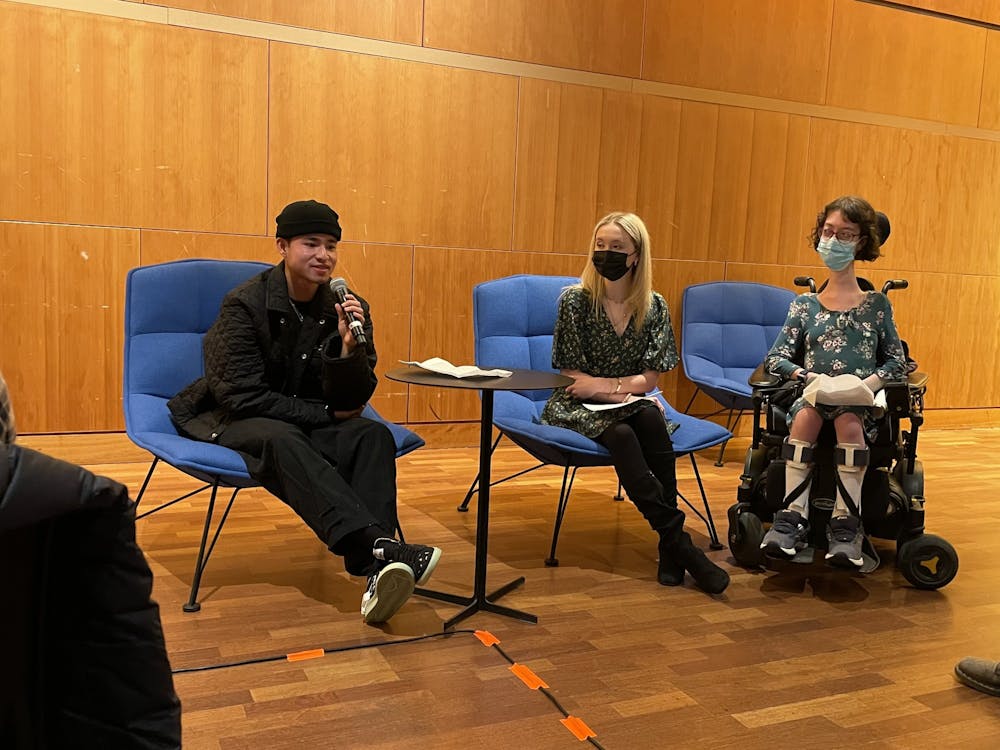Three years ago, Naomi Hess ’22 approached Rabbi Ira Dounn in the lobby of the Center for Jewish Life with a request.
February is Jewish Disability Awareness, Inclusion, and Acceptance Month, and Hess wanted the Center for Jewish Life to introduce disability awareness as one of the themed Shabbats that take place throughout the year.
Hess is associate news editor emerita for The Daily Princetonian and is a current senior news writer.
“As it was already February, we had a couple of weeks to plan it — but we did it!” Rabbi Ira Dounn said to the ‘Prince’ in an interview.
Hess was the main speaker of the first disability awareness Shabbat in 2019.
“[Hess] spoke so beautifully and charismatically, and it quickly became an annual celebration for the CJL,” Rabbi Ira Dounn said.
One of the highlights of “Disability Shabbat” is the headlining speaker, who shares their story and answers audience questions.
Since its founding, these speakers have included Hess herself, Jake Hytken, and Judy Heumann via Zoom. Hytken was a staffer on Hess’ birthright trip to Israel who has a similar disability as Hess — a form of muscular dystrophy. Heumann is a renowned disability rights advocate who served as Special Advisor for International Disability Rights in the Department of State from 2010–2017 and was a subject of the Netflix documentary “Crip Camp.”
This year — Hess’ final year organizing the Shabbat for the CJL — the CJL partnered with the Carl A. Fields Center and the Gender and Sexuality Resource Center to invite Chella Man, an artist, actor, model, and activist who identifies as Deaf, Chinese, transgender, and Jewish. Man joined the CJL for its traditional Shabbat dinner before answering questions at a Q&A at the Carl A. Fields Center about his experience at the confluence of different identities.
Tess Weinreich ’25 and Hess moderated the Q&A, posing submitted questions and then allowing the audience to engage with Man. There were ASL interpreters present at the event.
Weinreich is a news staff writer and features contributor for the ‘Prince.’
One of the first questions asked to Man was: “What role has disability rights activism played in your life, as well as how your Jewish identity informed your disability rights activism?”

“I think both of them have to do overall with understanding discrimination at an early age, with my mom able to tell me the framework to persevere through discrimination,” Man said. “I have found how resilient Jews can be, and although my parents and my family are not disabled themselves, I believe that there are a lot of stories in Judaism that educate us on how to rise up and persevere, despite adversity.”
Another question asked about Man’s creative process: “What drives your creativity?”
Man said that it depends on the concept.
“Sometimes I approach a project and I know exactly what I want to say, but I have no idea how I want to make it,” he said. “Other times, I know exactly what I want it to look like, but have no idea what I want to say. Sometimes, that is just enough, some things can just be aesthetically satisfying, and that averageness is almost radical.”
This sentiment of radical familiarity has pierced Man’s outlook on life and his relationship with his identities. Growing up in Pennsylvania, he said he was brought up in a loving family, but rarely found people that identified like him.
“When I was younger, in my early teens, I was not in a place where I could be fully solidified in my sense of self, and did not feel comfortable voicing who I was,” Man said. “It was not until I moved to New York City for college that I saw anyone out who was trans, and that I could deeply connect with for living unapologetically themselves.”
Through expressing his art on the stage and on the page, Man has made a name for himself and has amassed extraordinary support for his artistry and book “Continuum” that showcases his life outside the binary.
“I like the word ‘continuum’ rather than ‘spectrum’ because spectrum gives into the binary view of things. Gender and sexuality have more than two extremes, as does my identity,” Man said.
After four years of growth, the Jewish Disability Awareness and Inclusion Shabbat is slated to be a staple in the CJL’s repertoire of themed Shabbats.
“Succession planning for important events central to our calendar is crucial for their ongoing success after visionary leaders graduate, and we were intentional about that this year for JDAIM [Jewish Disability Awareness and Inclusion Month] Shabbat,” Rabbi Ira Dounn said.
In an interview with the ‘Prince,’ Man was asked, what advice he would give to Princeton students “who are struggling to come to terms with their identity and embrace themselves.”
“I would say first and foremost, find communities online that allow you to be anonymous so that you can engage comfortably,” he said. “Second, talk to these people, find people like yourself, and confide in them — develop a relationship even if you never get to meet them in person. But it all comes back to you — making you sure that you have a solidified sense of self and an established support system.”
This year, the event was organized by Hess, Weinreich, Katie Heinzer ’22, Naomi Frim-Abrams ’23, and Helena Frudit ’25, who spent several weeks coordinating the logistics of the night, as well as Chella Man’s arrival at the event.
Heinzer is a former podcast editor for the ‘Prince.’
The event took place on Friday, Feb. 25 from 8:30 to 9:30 p.m. at the Carl A. Fields Center following Shabbat Dinner at the CJL from 6:45 p.m. to 8 p.m.
Aidan Iacobucci is a Staff News Writer for the ‘Prince.’ He can be reached at iacobucci@princeton.edu or @aidaniaco on Instagram.








